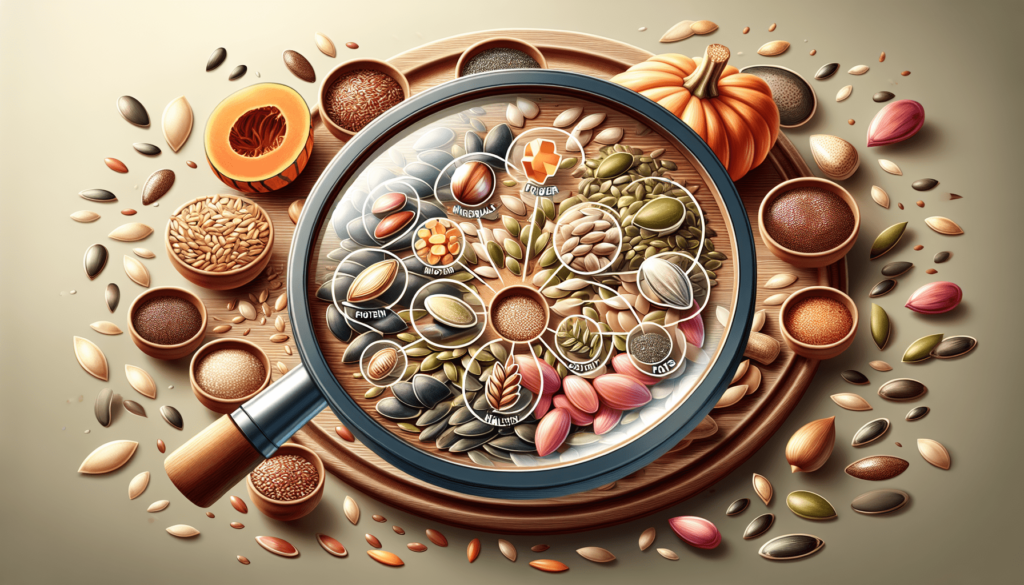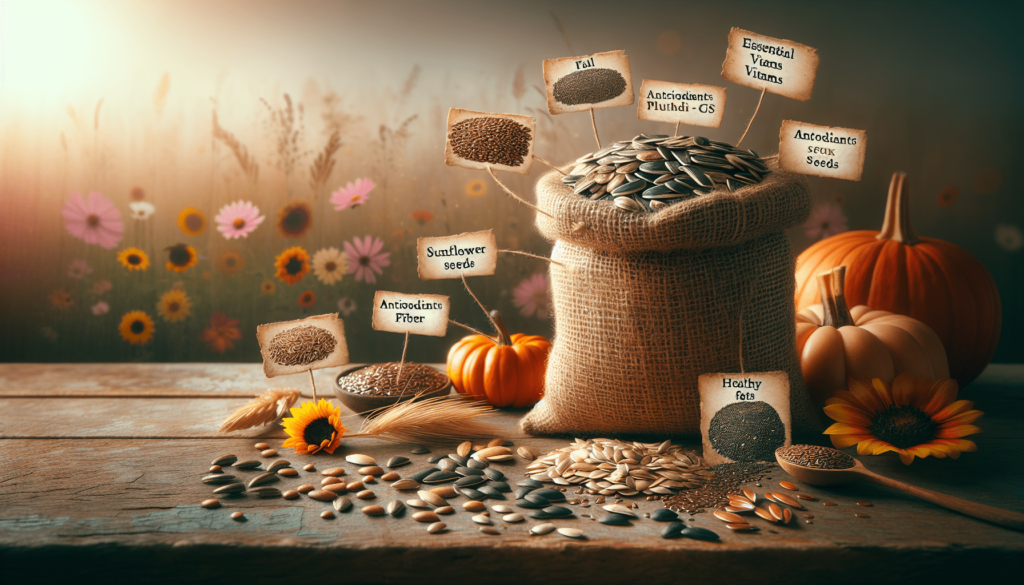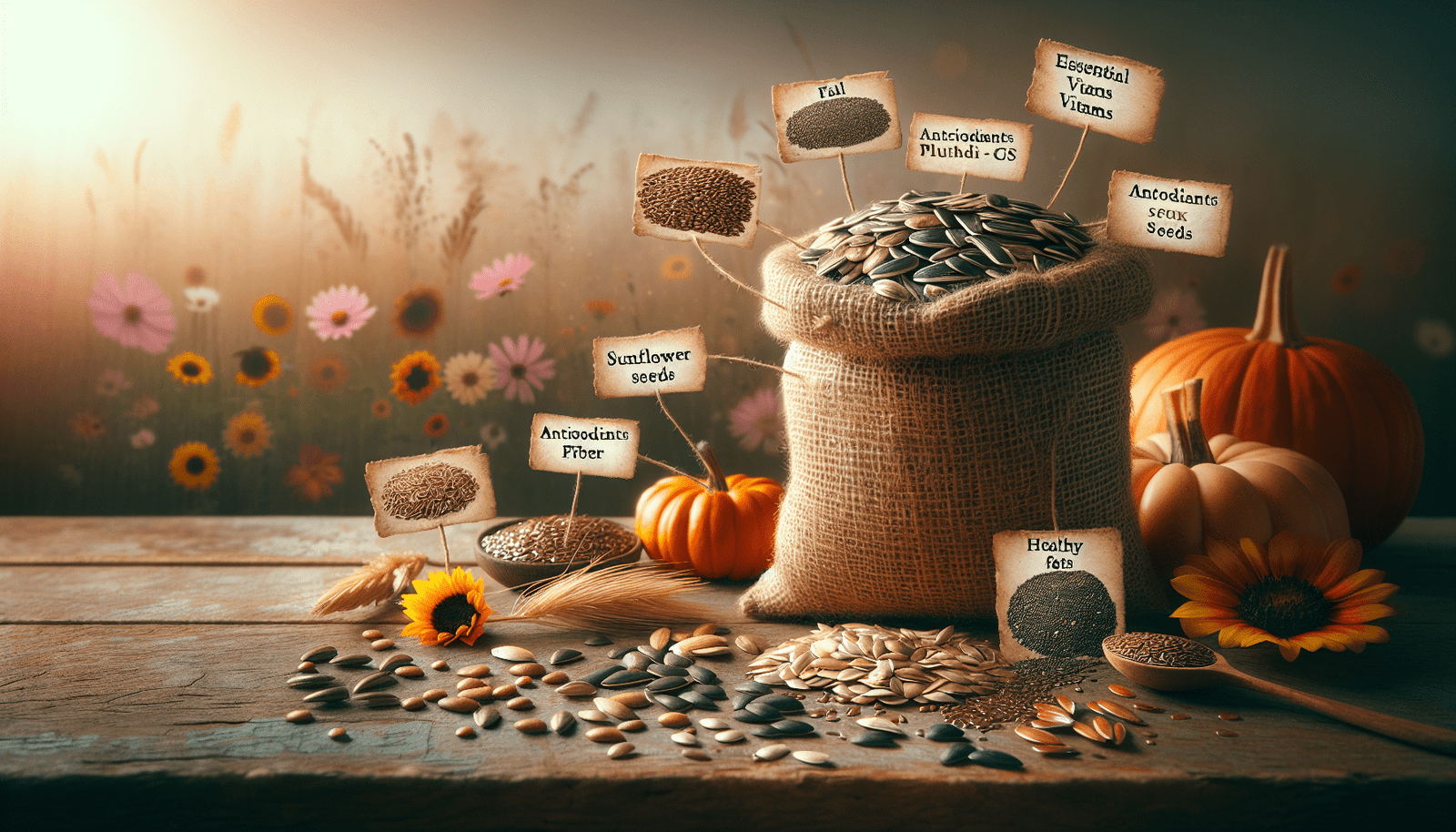If you’re looking for a simple yet impactful addition to your diet, look no further than seeds. Despite their small size, seeds pack a powerful punch when it comes to nutrition. From chia to flax to pumpkin, these tiny powerhouses are loaded with essential vitamins, minerals, and healthy fats. Whether you sprinkle them on top of your morning yogurt or incorporate them into your baking, seeds are a versatile and delicious way to boost your overall health.
Nutritional Value of Seeds
Seeds are often overlooked as a powerful source of nutrition, but their tiny size is deceiving. These small powerhouses are packed with essential nutrients that are vital for overall health and well-being. From vitamins and minerals to healthy fats and antioxidants, seeds offer a wide array of nutritional benefits that can support a balanced diet.
Rich in essential nutrients
Despite their small size, seeds are densely packed with an impressive range of essential nutrients. They are an excellent source of vitamins, including vitamin E, which plays a crucial role in protecting cells from damage. Additionally, seeds provide a rich supply of minerals such as magnesium, zinc, and selenium, all of which are necessary for various bodily functions. Incorporating a variety of seeds into your diet can help ensure that you’re getting a diverse range of essential nutrients.
Good source of healthy fats
While the idea of consuming fats may seem counterintuitive to maintaining a healthy diet, not all fats are created equal. Seeds are an excellent source of healthy fats, including omega-3 fatty acids, which have been associated with numerous health benefits. These fats promote heart health, reduce inflammation, and support brain function. Adding seeds to your daily meals can be an easy way to incorporate these beneficial fats into your diet.
High in fiber
Fiber is an essential component of a healthy diet, and seeds are a fantastic source of this vital nutrient. A high-fiber diet can aid digestion, regulate blood sugar levels, and promote weight management. Seeds such as chia seeds and flaxseeds are particularly rich in fiber, making them an excellent addition to your daily meals or snacks.
Packed with antioxidants
Antioxidants are compounds that help protect our cells from damage caused by harmful molecules called free radicals. Seeds contain a variety of antioxidants, including phenolic compounds and vitamin E. These antioxidants can help reduce inflammation, support immune function, and protect against chronic diseases. By incorporating a variety of seeds into your diet, you can ensure that you’re benefiting from a range of these powerful antioxidants.
Variety of Seeds
When it comes to seeds, there is certainly no shortage of options. Whether you’re looking to enhance the flavor of your meals or boost your nutrient intake, there’s a seed out there to suit everyone’s taste. Here are a few popular seeds that you can incorporate into your diet:
Flaxseeds
Flaxseeds have gained popularity in recent years due to their impressive nutritional profile. They are rich in omega-3 fatty acids, fiber, and lignans, which are plant compounds with antioxidant properties. These tiny seeds can be ground and added to smoothies, cereals, or used as an egg replacement in baking recipes.
Chia seeds
Chia seeds, often referred to as a superfood, are known for their high fiber and omega-3 fatty acid content. They also contain essential minerals such as calcium, phosphorus, and manganese. Chia seeds can be soaked in water or almond milk to create a gel-like consistency, making them a great addition to puddings or as a topping for yogurt and oatmeal.
Pumpkin seeds
Pumpkin seeds, also known as pepitas, are a delicious and nutritious snack option. They are an excellent source of magnesium, iron, zinc, and protein. Dry-roasted or lightly salted pumpkin seeds make for a crunchy and satisfying snack, or they can be sprinkled on salads or added to trail mix for an extra boost of nutrition.
Sunflower seeds
Sunflower seeds are not just a favorite snack option; they are also a nutritional powerhouse. These tiny seeds are packed with vitamin E, magnesium, selenium, and healthy fats. They can be enjoyed as a standalone snack or sprinkled on top of salads for added crunch.
Sesame seeds
Sesame seeds have been used for centuries in various cuisines for their nutty flavor and unique texture. They are a rich source of calcium, iron, and antioxidants. Sesame seeds can be toasted and used as a topping for dishes such as stir-fries, salads, or added to homemade bread for an added crunch.

Health Benefits of Seeds
Incorporating seeds into your daily diet can offer a wide range of health benefits. Let’s explore some of the potential advantages that come with regular seed consumption:
Promote heart health
Many seeds, such as chia seeds and flaxseeds, are rich in omega-3 fatty acids, which have been shown to support heart health. These essential fats can help lower cholesterol levels, reduce inflammation, and improve overall cardiovascular function. By incorporating a variety of seeds into your diet, you can enhance your heart health and reduce the risk of heart disease.
Support weight management
Seeds are an excellent addition to a balanced diet for those looking to maintain or lose weight. The high fiber content in seeds can help promote feelings of fullness, reduce appetite, and regulate blood sugar levels. Including a variety of seeds in your meals can help support healthy weight management and prevent overeating.
Boost brain function
Omega-3 fatty acids, found in seeds like chia and flaxseeds, are beneficial for brain health and function. They have been associated with improved cognitive function, memory, and mood stability. Regular consumption of these seeds can provide your brain with the necessary nutrients to thrive and perform at its best.
Reduce inflammation
Inflammation is a natural response of the body to injury or infection, but chronic inflammation can contribute to various diseases, including heart disease and diabetes. Seeds, such as pumpkin seeds and sunflower seeds, are rich in antioxidants that help reduce inflammation and protect cells from damage. By incorporating these seeds into your diet, you can help combat chronic inflammation and promote overall well-being.
Improve digestion
Fiber is essential for maintaining a healthy digestive system. Seeds, particularly chia seeds and flaxseeds, are excellent sources of fiber that can support regular bowel movements and prevent constipation. Additionally, the fiber content in seeds can promote a healthy gut microbiome, contributing to overall digestive health.
Seed Consumption Techniques
Seeds can be enjoyed in a variety of ways, depending on personal preference and dietary needs. Here are a few popular consumption techniques:
Raw
Eating seeds raw is a simple and convenient way to enjoy their nutritional benefits. Seeds such as sunflower seeds and pumpkin seeds can be eaten raw as a standalone snack or added to salads or trail mix for an extra crunch.
Roasted
Roasting seeds enhances their flavor and can give them a satisfying crunch. Pumpkin seeds and sunflower seeds are often roasted with a touch of salt or spices to create a delicious snack. Roasted seeds can also be ground and used as a flavorful seasoning for various dishes.
Ground
Grinding seeds into a fine powder can unlock their nutritional potential and make them easier to incorporate into meals. Chia seeds and flaxseeds are commonly ground and added to smoothies, baked goods, or used as a thickening agent in recipes.
Soaked
Soaking seeds, such as chia seeds, can create a gel-like consistency that can be enjoyed as a pudding or used as a vegan egg substitute in baking. Soaking can also enhance the digestibility of certain seeds, making it easier for the body to absorb their nutrients.

Seed-Based Recipes
If you’re looking for creative ways to incorporate seeds into your diet, here are a few delicious and nutritious recipes to try:
Seed crackers
Homemade seed crackers are a healthy alternative to store-bought crackers. Combine a variety of seeds, such as flaxseeds, chia seeds, and sesame seeds, with water, spices, and a binding agent like psyllium husk or flaxseed meal. Roll out the mixture, bake until crispy, and enjoy these crunchy and fiber-rich crackers with your favorite toppings or dips.
Seed butter
Seed butter, similar to nut or seed butter, can be made by blending roasted sunflower seeds, pumpkin seeds, or a combination of both. Add a touch of salt or sweetener if desired and blend until smooth. The resulting butter can be spread on toast, used as a dip for fruits, or incorporated into various recipes as a nutritious and flavorful alternative to traditional nut butter.
Seed bars
Seed bars are a convenient, on-the-go snack option that can be packed with nutritional goodness. Combine a mixture of your favorite seeds, such as chia seeds, flaxseeds, and pumpkin seeds, with nut butter, honey or maple syrup, and a selection of dried fruits or nuts. Press the mixture into a baking pan, refrigerate until firm, and cut into bars for a healthy and satisfying snack.
Seed smoothies
Boost the nutritional value of your morning smoothies by adding a spoonful of ground seeds such as chia seeds or flaxseeds. The seeds will not only add a subtle texture but also provide a healthy dose of fiber, omega-3 fatty acids, and antioxidants. Experiment with different seed combinations and fruit flavors to find your perfect blend.
Growing Your Own Seeds
If you’re interested in cultivating your own seeds, here are some essential tips to get you started:
Choosing the right seeds
Selecting the right seeds for your climate and growing conditions is essential. Research which types of seeds are suitable for your geographic location and ensure they are from reputable sources. Look for organic, non-GMO seeds to maintain a high-quality and sustainable garden.
Preparing the soil
Before planting your seeds, prepare the soil by removing any weeds or debris and adding organic matter such as compost or well-rotted manure. Ensure that the soil is well-drained and fertile, as this will provide the best conditions for seed germination and plant growth.
Planting and caring for seeds
Follow the instructions on the seed packets regarding planting depth and spacing to ensure optimal growth. Water the seeds gently and consistently, and monitor the soil moisture levels to avoid over or underwatering. Providing adequate sunlight, protection from pests, and regular nutrient replenishment through natural fertilizers will help your seeds thrive.
Harvesting and storing seeds
Once your seeds have matured, it’s time to harvest them. Each type of seed will have different harvesting guidelines, so refer to specific instructions for each plant. Generally, seeds should be harvested when they are fully matured and the fruits or seed heads have dried. Store the harvested seeds in a cool, dry place in airtight containers to maintain their viability for future use.
Seeds for Special Dietary Needs
Seeds offer a range of options for individuals with specific dietary needs. Here are a few examples:
Gluten-free options
Seeds such as chia seeds, flaxseeds, and pumpkin seeds are naturally gluten-free, making them excellent alternatives for those following a gluten-free diet. Incorporate these seeds into your meals and recipes to add texture and nutrition without the worry of gluten-containing ingredients.
Vegan protein sources
Seeds are an excellent source of plant-based protein, making them a valuable addition to a vegan or vegetarian diet. Hemp seeds, chia seeds, and pumpkin seeds are particularly rich in protein. Sprinkle them on salads, blend them into smoothies, or use them as a topping for plant-based dishes to boost your protein intake.
Low-carb alternatives
For individuals following a low-carb diet, seeds provide a nutrient-dense source of energy without the high carbohydrate content. Flaxseeds, chia seeds, and sunflower seeds are all low in carbohydrates and can be incorporated into various low-carb recipes and meals.
Paleo-friendly choices
In the Paleo diet, which focuses on consuming foods similar to those eaten by our ancestors, seeds play an important role. Pumpkin seeds, sunflower seeds, and chia seeds are all Paleo-friendly options that can be enjoyed as snacks, added to meals, or incorporated into Paleo baking recipes.
Seeds for Snacking
Seeds make for an excellent snack option that is not only portable but also highly nutritious. Here’s why seeds are a perfect choice for snacking:
Portable and easy to carry
Seeds are small and lightweight, making them a convenient snack to carry with you on the go. Whether you’re heading to work, out for a hike, or on a road trip, seeds can be easily packed in a small container or resealable bag for a quick and satisfying snack wherever you are.
Crunchy and satisfying
Many seeds, such as pumpkin seeds and sunflower seeds, have a satisfying crunch that can help curb cravings for less healthy snacks. The act of chewing on these crunchy seeds can also be an enjoyable and mindful experience, allowing you to savor each bite.
Healthy alternative to processed snacks
Snacking on seeds is a much healthier alternative to processed snacks that are often high in unhealthy fats, sodium, and added sugars. By choosing seeds as a snack, you can nourish your body with essential nutrients rather than empty calories.
Versatile for adding to trail mix
Creating your own trail mix allows you to customize the ingredients to your taste and nutritional needs. Adding a variety of seeds, such as chia seeds, pumpkin seeds, and sunflower seeds, to your trail mix can provide an extra boost of nutrition and flavor. Combine seeds with dried fruits, nuts, and a touch of dark chocolate for a delicious and energizing snack.
Seeds in Traditional Cuisines
Seeds have been a staple in traditional cuisines around the world for centuries. Here are a few examples of how seeds are used in various cultural dishes:
Tahini in Mediterranean cuisine
Tahini, a paste made from ground sesame seeds, is a popular ingredient in Mediterranean cuisine. It is used in dips like hummus and baba ghanoush, as a dressing for salads, and as a flavoring agent in sauces. Not only does tahini provide a unique nutty taste, but it also adds a creamy texture and rich source of healthy fats to dishes.
Flaxseed in Indian cuisine
In Indian cuisine, flaxseed, known as alsi or jawas, is commonly used in various dishes. Flaxseed powder is added to chutneys, curries, and bread to enhance both flavor and nutritional value. Flaxseed oil is also utilized in cooking or drizzled over dishes as a finishing touch.
Pumpkin seeds in Mexican cuisine
Pumpkin seeds, or pepitas, are a key ingredient in Mexican cuisine. Roasted and salted pumpkin seeds are often sprinkled on top of dishes like soups, stews, and salads for an added crunch and burst of flavor. They can also be ground and used as a base for traditional Mexican sauces such as pipian.
Sesame seeds in Asian cuisine
Sesame seeds are widely used in Asian cuisine, especially in dishes originating from China, Japan, and Korea. Toasted sesame seeds are sprinkled on top of stir-fries, noodle dishes, and sushi rolls to add a nutty flavor and textural contrast. Sesame oil, derived from sesame seeds, is a popular cooking oil used for its aromatic properties.
Incorporating Seeds in Everyday Diet
Now that we’ve explored the nutritional benefits, variety, and usage of seeds, let’s look at some simple ways to incorporate them into your everyday diet:
Sprinkle them on salads
Add a sprinkle of seeds, such as sesame seeds or pumpkin seeds, to your favorite salads for extra texture and nutritional value. Seeds can provide a satisfying crunch while boosting the nutrient content of your greens.
Mix them into yogurt or oatmeal
Stirring seeds like chia seeds or flaxseeds into a bowl of yogurt or oatmeal can add a nutritional and flavor boost to your breakfast. The seeds will help add a satisfying texture while providing a range of essential nutrients.
Blend them into smoothies
Boost the nutritional profile of your favorite smoothie by blending in a spoonful of ground seeds. Chia seeds or hemp seeds can blend seamlessly into smoothies, adding fiber, protein, and healthy fats without altering the taste.
Use them as a topping for soups or stir-fries
Sprinkle a handful of seeds over your soups or stir-fries just before serving to add a crunchy element. Seeds like sunflower seeds or sesame seeds can enhance the overall flavor profile of your dishes while giving them a visual appeal.
Incorporating seeds into your everyday diet is an easy and effective way to reap their nutritional benefits. Whether you choose to snack on them, include them in your recipes, or explore traditional cuisines that utilize seeds, you’ll be adding a mighty nutritional powerhouse to your meals. So, why not start incorporating seeds into your diet today and enjoy the many health benefits they offer?

